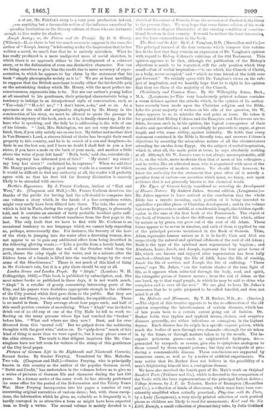Joseph Anstey ; or, the Patron and the Protege. By
D. S. Henry..
(Wilson.)—If, as there is but too much reason to suppose is the case, the author of "Joseph Anstoy "is labouring under the impression that he has written a novel, we much fear that he is entirely mistaken. What he has really produced is a mere undigested mass of social sketches, in which there is no approach either to the development of a coherent story, or to the delineation of even one distinctive character. Nor can we bring ourselves to give him the credit due to mere accuracy of repre- sentation, to which he appears to lay claim by the statement that his book "simply photographs society as it is." We are at least unwilling to suppose that the British merchant is really either the intolerable prig or the astonishing donkey which Mr. Henry, with the most perfect un- consciousness, represents him to be. Nor are our author's young ladies at all unsuited to his gentlemen, their principal characteristic being a tendency to indulge in an interjectional style of conversation, such as "Yes—hah !" " H-a-h! no ;" "I don't know, a-ha," and so on. As a specimen of the skill and originality displayed by Mr. Henry in the construction of his story, we must be allowed to quote the passage in which the mystery of the book, such as it is, is finally cleared up. It is the hero who is speaking, and the lady he is addressing is the wife of one of his friends. "'And, Mrs. Shinington, we are not very distantly re- lated, then, if you only satisfy me on one fact. My father and mother died in Van Diemen's Land, a sincere friend of theirs has brought their small property to this country, and he is in search of a son and daughter—he finds in me the lost son, and I have no doubt I shall find in you a lost sister, if you have a mole on the back of your neck, and another a little above the wrist of your left hand.' 'Both, both,' said she, convulsively ; 'what mystery has informed you of this ? " My sister ! my sister !
my long lost sister !' exclaimed be, in raptures." When we add that Mr. Henry prefers spelling a good many words in a manner for which it would be difficult to find any authority at all, the reader IN ill probably agree with us that his first bid for literary distinction is scarcely likely to be attended with success.






























 Previous page
Previous page